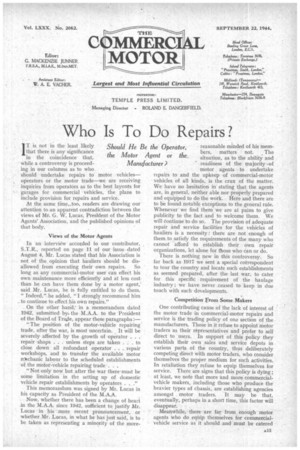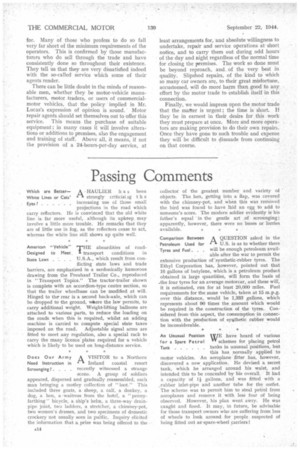Who Is To Do Repairs?
Page 15

Page 16

If you've noticed an error in this article please click here to report it so we can fix it.
IT is not in the least likely that there is any significance in the coincidence that, while a controversy is proceeding in our columns as to who should undertake repairs to motor vehicles— operators or the motor trade—we are receiving inquiries from operators as to the best layouts for garages for commercial vehicles, the plans to include provision for repairs and service. At the same time,.too, readers are -drawing our attention to an apparent contradiction between the views of Mr. G. W. Lucas, President of the Motor Agents' Association, and the published opinions of that body.
Views of the Motor Agents In an intervidw accorded to our contributor, S.T.R., reported on page 11 of our issue dated August 4, Mr. Lucas stated that his Association is not of the, opinion that hauliers should be dis allowed from executing their own repairs_ So long as any commercial-motor user can effect his own maintenance more efficiently and at less cost than he can have them done by a motor agent,said Mr. Lucas, he is fully entitled to do them. " Indeed," he added, "I strongly recommend him . to continue to effect his own repairs."
On the other harid; in a memorandum dated 1942, submitted by. the M.A.A. to the President of the Board of Trai;le, appear these paragraphs:— " The position of the motor-vehicle repairing' trade, after the war, is most uncertain. It will be severely affected by the growth of operator . . . repair shops . . . unless steps are taken . . . to close down all redundant operator . . . repair workshops, and to transfer the available motor nkchanic labour to the scheduled establishments of the motor-vehicle repairing trade . . .
"Not only now but after the war there•must be some limitation in the setting up of domestic vehicle repair establishments by operators . . ."
This memorandum was signed by Mr. Lucas in his capacity as President of the M.A.A. • Now, whether there has been a change of heart in the M.A.A. since 1042, sufficient to justify ,Mr. Lucas in his more recent pronouncement, or whether Mr. Lucas, in what he has just said, is to be taken as representing a minority of the more reasonable minded of his members, matters not. The situation, as to the ability and readiness of the inajority,of motor agents to undertake repairs to and the upkeep of commercial-motor vehicles of all kinds, is the crux of the matter. We have no hesitation in' stating that the agents are, in general, neither able nor properly prepared and equipped to do the work. Here and there are to be found notable exceptions to the general rule. Whenever we find them we are at pains to give publicity to the fact and to welcome them. We will continue to do so. The provision of adequate repair and service facilities for the vehicles of hauliers is a necessity : there are not enough of them to satisfy the requirements of the many who cannot afford to establish their own repair organizations, let alone for those who Can or do.
There is nothing new in this controversy. So far back as 1917 we sent a special correspondent to tour the country and locate such establishments as seemed prepared, after the last war, to cater for this specific requirement of the haulage industry ; we have never ceased to keep in due touch with suchdevelopments.
Competition • from Some Makers One contributing cause of the lack of interest of the motor trade in commercial-motor repairs and service is the trading policy of one section of the manufacturers. Those in it refuse to appoint motor traders as their representatives and prefer to sell direct to ,users. In support of this policy they establish their own sales and service depots in various parts of the country, thus deliberately competing direct with motor traders, who consider themselves the proper medium for such activities. In retaliation they refuse to equip themselves for service. There are signs that this policy is dying; at least, we note that more and more commercialvehicle makers, including those who produce the heavier types of chassis, are establishing agencies amongst motor traders. It may be that, eventually, perhaps in a short time, this factor will disappear.
Meanwhile, there are far from enough motor agents who do equip themselves for commercialvehicle service as it should and must be catered for. Many of those who profess to do so fall very far short of the minimum requirements of the operators. This is confirmed by those manufacturers who do sell through the trade and have consistently done so throughout their existence. They tell us that they are very dissatisfied indeed with the so-called service which some of their agents render.
There can be little doubt in the minds of reasonable men, whether they be motor-vehicle manufacturers, motor traders, or users of commercialmotor vehicles, that the policy implied in Mr. Lucas's expression of opinion is sound. Motor repair agents should set themselves out to offer this service. This means the purchase of suitable equipment; in many cases it will involve alterations or additions to premises, also the engagement and training of staff. Above all, it means, if not the provision of a 24-hours-per-day .service, at least arrangements for, and absolute willingness to undertake, repair and service operations at short notice, and to carry them out during odd hours. of the day and night regardless of the normal time for closing the premises. The work so done must be beyond reproach, and, of the very best in quality. Slipshod repairs, of the kind to which so many car owners are, to their great misfortune, accustomed, will do mord harm than good to any effort by the motor trade to establish itself in this connection.
Finally, we would impress upon the motor trade that the matter is urgent ; the time is short. If they be in earnest in their desire for this work they must prepare at once. More and more operators are making provision to do their own repairs. Once they have gone to such trouble and expense they will be difficult to dissuade from continuing on that course.




















































